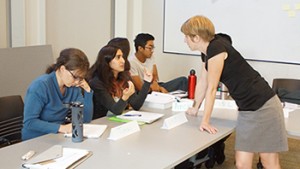Treating bone fractures in the developing world is increasingly difficult due to the lack of x-ray accessibility. Emily Huynh, a senior at UC Berkeley studying Bioengineering, thought: if bone fractures were diagnosed and treated properly in an affordable way, large populations of people could avoid the chronic pain, disability, and socioeconomic disadvantage that mistreated fractures cause. This past spring, Huynh and her team won third place in Big Ideas’ Hardware for Good category for a medical device that provides orthopedic care in underdeveloped countries and remote settings called Fractal.

News
A New “OnRamp” Class for Social Innovators
By Tamara Straus Some people have called it the personalization of higher education. Others see it as the natural evolution of pedagogy at a world-class



